外研版(2019)必修第二册Unit 6 Earth first Listening and speaking课件(共24张PPT)
文档属性
| 名称 | 外研版(2019)必修第二册Unit 6 Earth first Listening and speaking课件(共24张PPT) |  | |
| 格式 | zip | ||
| 文件大小 | 5.6MB | ||
| 资源类型 | 教案 | ||
| 版本资源 | 外研版(2019) | ||
| 科目 | 英语 | ||
| 更新时间 | 2022-07-11 16:00:58 | ||
图片预览

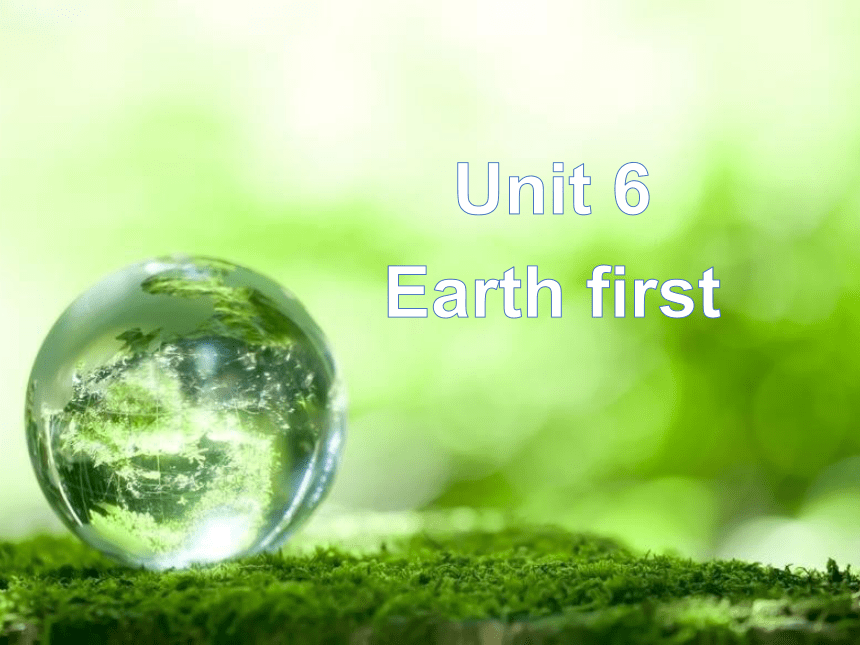
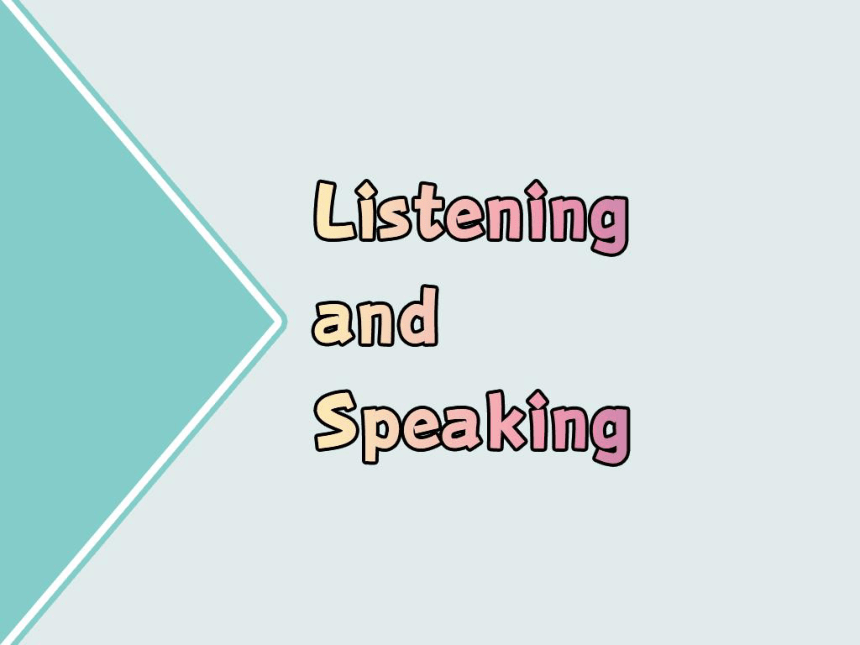
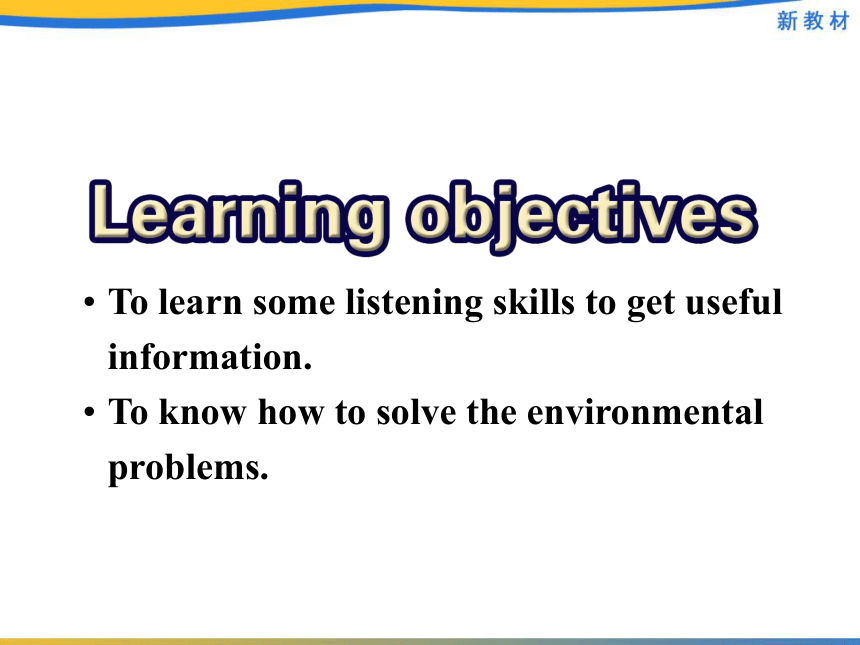
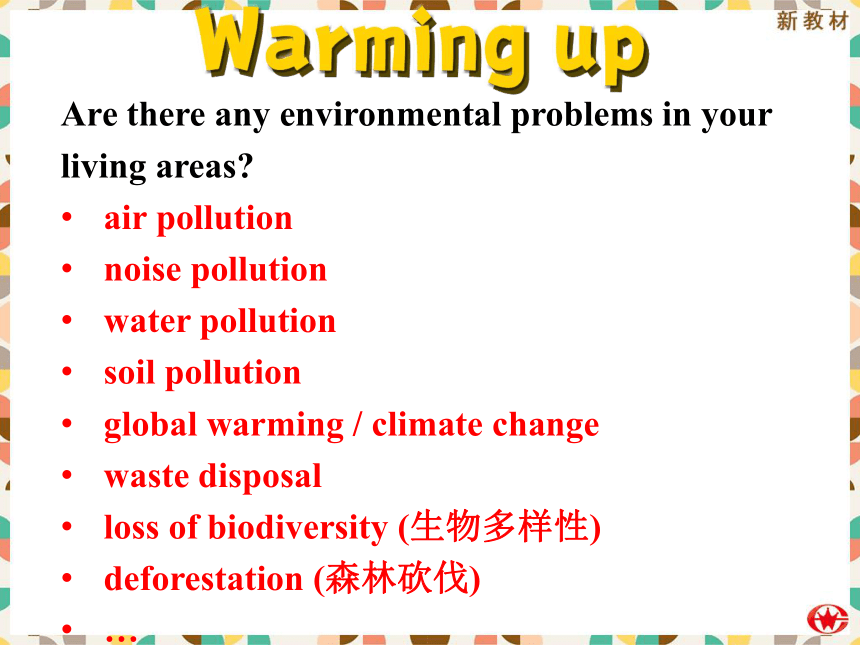
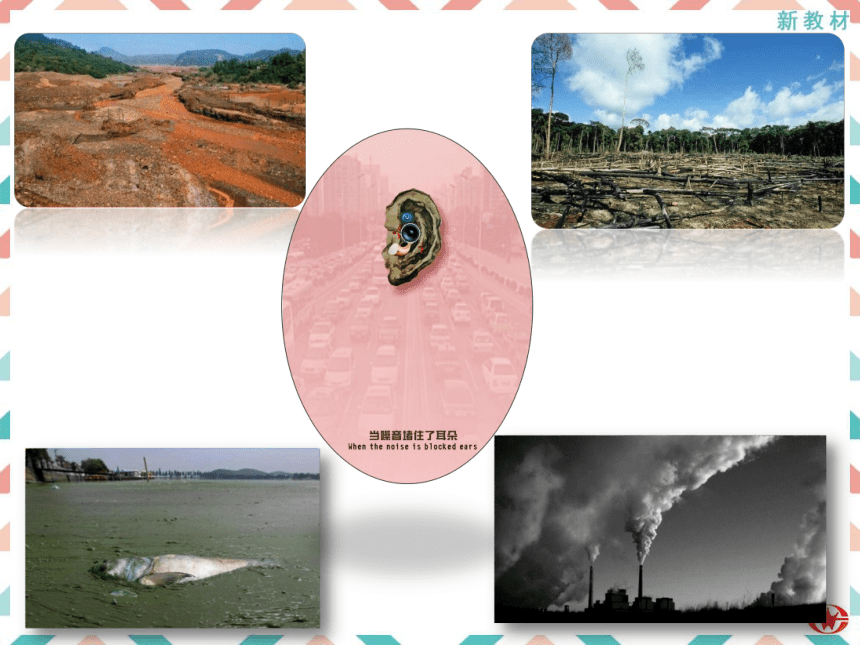
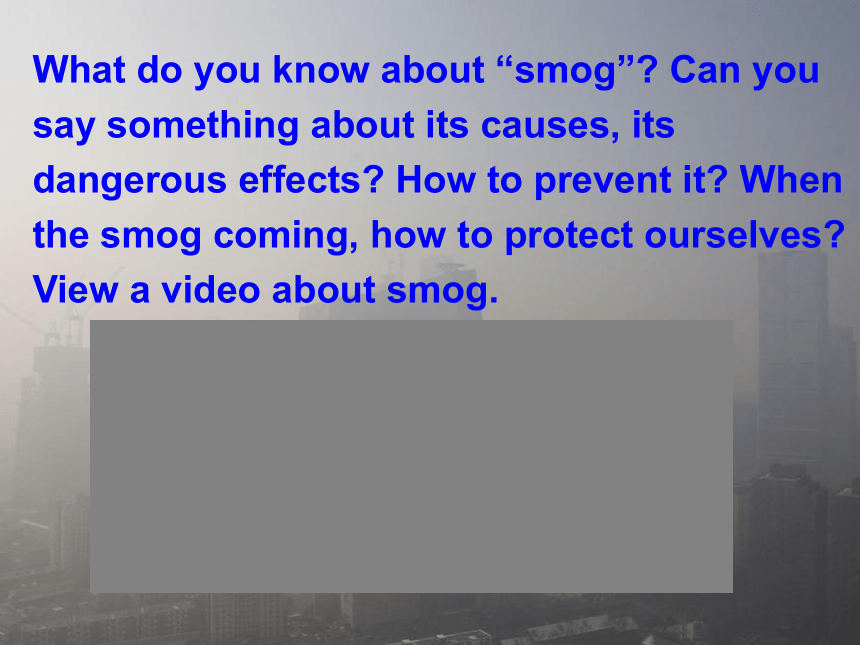
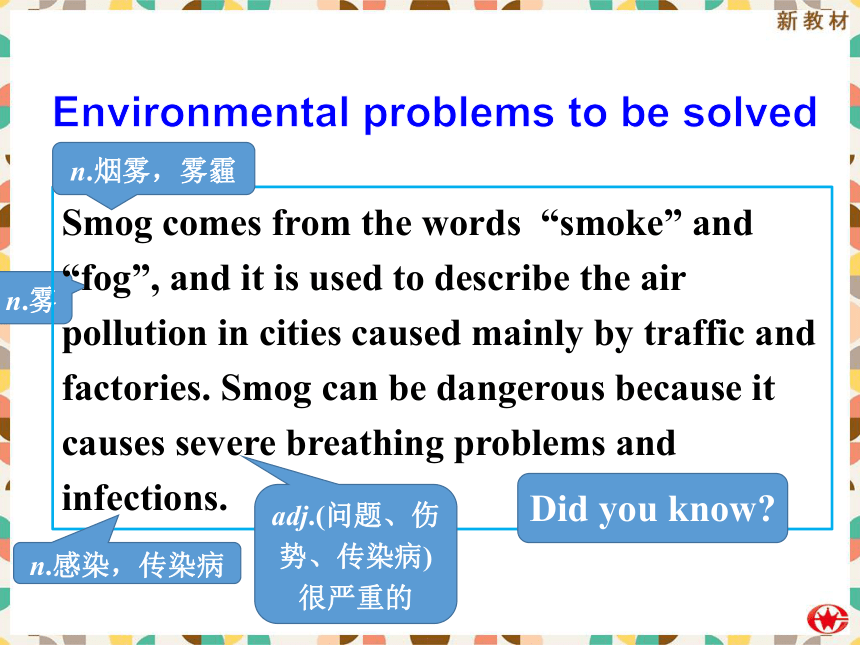

文档简介
(共24张PPT)
Unit 6
Unit 6
Earth first
To learn some listening skills to get useful information.
To know how to solve the environmental problems.
Are there any environmental problems in your living areas
air pollution
noise pollution
water pollution
soil pollution
global warming / climate change
waste disposal
loss of biodiversity (生物多样性)
deforestation (森林砍伐)
…
What do you know about “smog” Can you say something about its causes, its dangerous effects How to prevent it When the smog coming, how to protect ourselves
View a video about smog.
n.雾
Smog comes from the words “smoke” and “fog”, and it is used to describe the air pollution in cities caused mainly by traffic and factories. Smog can be dangerous because it causes severe breathing problems and infections.
Did you know
Environmental problems to be solved
n.烟雾,雾霾
adj.(问题、伤势、传染病)很严重的
n.感染,传染病
Listen to the lecture and choose the topics that are covered.
What the word “smog” means.
When the word “smog” appeared.
What caused smog in the past.
What causes smog now.
The effects of smog on the environment.
How governments try to reduce smog.
What will happen if we don’t reduce smog.
n. ( 尤指大学里的)讲座,讲课,演讲
听力原文
Lecturer: Good evening, everyone, and thank you for coming to today’s talk. I’m Dr Brown and I’m going to talk about air pollution in cities- what we all know as “smog”. Please feel free to stop me if you have any questions. So, first of all, a bit of history. The term “smog” was first used in the 1800s in cities that had problems with smoke and fog.
Student A: Sorry for interrupting, but I believe
it was in the 1900s.
Lecturer: Sorry, I made a mistake. You are right. It was in the 1900s. Thank you. London was one of the cities where smog caused big problems. In December 1952, it suffered from “The Great Smog”. It was a very cold winter, so a lot of coal was burned at home and in the factories. The problem was that there was no wind, so thick smog covered the city. Nowadays…
打扰,打断
Student B: Excuse me, but can I just ask- did the smog cause any deaths
Lecturer: I’m afraid so. According to research, about 4,000 people are known to have died as a result of the smog, but that number could be much higher. It was terrible! Nowadays, smog still exists, but is produced by chemicals coming from traffic and factories. However, governments are taking measures to reduce smog as much as possible. Now, let’s look at what smog does to our health…
采取措施
Student A: If I could just stop you again… Can you give us examples of these measures
Lecturer: Well, for example, factories must follow rules about what chemicals they use. In some cities, when there’s smog, people have to pay to drive in the centre. Now, let’s move on to the impact of smog on our health…
Listen again and complete the slides.
Smog in the past
Term created in: _______
Big problem in London:
________________ in December 1952
Causes of the problem: burning too much
coal and ___________
1900s
The Great Smog
no wind
n. 幻灯片
Smog in the present
Causes of the problem:
___________________________
Measures: rules about using __________ in factories and ______________________ _________ in the city centre.
chemicals coming from traffic
chemicals
requirements of paying to
drive
What other measures can be taken both by government or by us individuals to prevent smog besides the ones talked in the listening text
How to interrupt others politely Can you list some examples What’s the function of using them
Sorry for interrupting, but …
Excuse me, but can I just ask …
If I could just stop you …
May I ask you something about…
If it is OK to you, can I …
Sorry, but let me interrupt for a minute, please.
Sorry to cut in, but…
Can I say something
May I please interject
I’m sorry to barge in like this, but…
I’m sorry to cut you off, but…
Work in pairs and talk about recycling.
Student A
Tell Student B about recycling using the information on Page 84. Be prepared to be corrected by Student B.
Useful expressions
Please feel free to stop me if you have any questions.
Sorry, I’ve made a mistake.
You’re right,…
I’m afraid…
Well, …
Student B
Listen to Student A talking about recycling. Interrupt politely to correct him/her using the information on Page 87.
Useful expressions
Sorry to interrupt, but…
Excuse me, but can I just ask…
Could I just stop you again to check…
Do you mind if I ask another question
Sorry, but I was wondering whether…
Is it OK if I jump in for a second
A polite interruption is usually framed as a request for permission to interrupt someone, often starting with If…, May I… Or Can I… This may be preceded (先于) with an apology such as Sorry, … or Excuse me, … Usually we interrupt someone when they pause for breath, or during the slight pause between spoken clauses.
Here is something you should pay attention to when you need to interrupt others.
Learning to learn
Work in pairs. Talk about another environmental problem and have a similar conversation.
Tips: 1. students can be divided into small groups and given a new environmental subject (for example, how to treat water pollution or the present of a natural reserve) to make a dialogue.
2. Some groups can make a presentation to the whole class.
Water shortage is a global problem nowadays. It is an essential question for us to think about how to save water. Can you give some measures about water-saving List as many as you can.
Unit 6
Unit 6
Earth first
To learn some listening skills to get useful information.
To know how to solve the environmental problems.
Are there any environmental problems in your living areas
air pollution
noise pollution
water pollution
soil pollution
global warming / climate change
waste disposal
loss of biodiversity (生物多样性)
deforestation (森林砍伐)
…
What do you know about “smog” Can you say something about its causes, its dangerous effects How to prevent it When the smog coming, how to protect ourselves
View a video about smog.
n.雾
Smog comes from the words “smoke” and “fog”, and it is used to describe the air pollution in cities caused mainly by traffic and factories. Smog can be dangerous because it causes severe breathing problems and infections.
Did you know
Environmental problems to be solved
n.烟雾,雾霾
adj.(问题、伤势、传染病)很严重的
n.感染,传染病
Listen to the lecture and choose the topics that are covered.
What the word “smog” means.
When the word “smog” appeared.
What caused smog in the past.
What causes smog now.
The effects of smog on the environment.
How governments try to reduce smog.
What will happen if we don’t reduce smog.
n. ( 尤指大学里的)讲座,讲课,演讲
听力原文
Lecturer: Good evening, everyone, and thank you for coming to today’s talk. I’m Dr Brown and I’m going to talk about air pollution in cities- what we all know as “smog”. Please feel free to stop me if you have any questions. So, first of all, a bit of history. The term “smog” was first used in the 1800s in cities that had problems with smoke and fog.
Student A: Sorry for interrupting, but I believe
it was in the 1900s.
Lecturer: Sorry, I made a mistake. You are right. It was in the 1900s. Thank you. London was one of the cities where smog caused big problems. In December 1952, it suffered from “The Great Smog”. It was a very cold winter, so a lot of coal was burned at home and in the factories. The problem was that there was no wind, so thick smog covered the city. Nowadays…
打扰,打断
Student B: Excuse me, but can I just ask- did the smog cause any deaths
Lecturer: I’m afraid so. According to research, about 4,000 people are known to have died as a result of the smog, but that number could be much higher. It was terrible! Nowadays, smog still exists, but is produced by chemicals coming from traffic and factories. However, governments are taking measures to reduce smog as much as possible. Now, let’s look at what smog does to our health…
采取措施
Student A: If I could just stop you again… Can you give us examples of these measures
Lecturer: Well, for example, factories must follow rules about what chemicals they use. In some cities, when there’s smog, people have to pay to drive in the centre. Now, let’s move on to the impact of smog on our health…
Listen again and complete the slides.
Smog in the past
Term created in: _______
Big problem in London:
________________ in December 1952
Causes of the problem: burning too much
coal and ___________
1900s
The Great Smog
no wind
n. 幻灯片
Smog in the present
Causes of the problem:
___________________________
Measures: rules about using __________ in factories and ______________________ _________ in the city centre.
chemicals coming from traffic
chemicals
requirements of paying to
drive
What other measures can be taken both by government or by us individuals to prevent smog besides the ones talked in the listening text
How to interrupt others politely Can you list some examples What’s the function of using them
Sorry for interrupting, but …
Excuse me, but can I just ask …
If I could just stop you …
May I ask you something about…
If it is OK to you, can I …
Sorry, but let me interrupt for a minute, please.
Sorry to cut in, but…
Can I say something
May I please interject
I’m sorry to barge in like this, but…
I’m sorry to cut you off, but…
Work in pairs and talk about recycling.
Student A
Tell Student B about recycling using the information on Page 84. Be prepared to be corrected by Student B.
Useful expressions
Please feel free to stop me if you have any questions.
Sorry, I’ve made a mistake.
You’re right,…
I’m afraid…
Well, …
Student B
Listen to Student A talking about recycling. Interrupt politely to correct him/her using the information on Page 87.
Useful expressions
Sorry to interrupt, but…
Excuse me, but can I just ask…
Could I just stop you again to check…
Do you mind if I ask another question
Sorry, but I was wondering whether…
Is it OK if I jump in for a second
A polite interruption is usually framed as a request for permission to interrupt someone, often starting with If…, May I… Or Can I… This may be preceded (先于) with an apology such as Sorry, … or Excuse me, … Usually we interrupt someone when they pause for breath, or during the slight pause between spoken clauses.
Here is something you should pay attention to when you need to interrupt others.
Learning to learn
Work in pairs. Talk about another environmental problem and have a similar conversation.
Tips: 1. students can be divided into small groups and given a new environmental subject (for example, how to treat water pollution or the present of a natural reserve) to make a dialogue.
2. Some groups can make a presentation to the whole class.
Water shortage is a global problem nowadays. It is an essential question for us to think about how to save water. Can you give some measures about water-saving List as many as you can.
